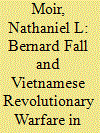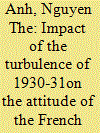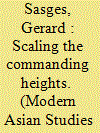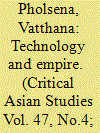|
|
|
Sort Order |
|
|
|
Items / Page
|
|
|
|
|
|
|
| Srl | Item |
| 1 |
ID:
158958


|
|
|
|
|
| Summary/Abstract |
This article assesses Bernard Fall’s concept of Vietnamese Revolutionary Warfare in Indochina between 1953 and 1958. It also investigates differences in the conceptualization of Revolutionary Warfare between Fall and proponents of French military doctrine known as la guerre révolutionnaire. The last component of the article considers limits of Fall’s influence on counterinsurgency doctrine.
|
|
|
|
|
|
|
|
|
|
|
|
|
|
|
|
| 2 |
ID:
110222


|
|
|
|
|
| Publication |
2011.
|
| Summary/Abstract |
The events of the early 1930s in Vietnam left an important legacy to France's literature of enquiry and protest. Writers, essayists and journalists enquired on behalf of their audiences, and in the process developed France's littérature coloniale. By showing an interest in the colonial 'other' and identifying discrepancies between imperial ideology and colonial reality, they formed a new body of thought. This new colonial humanism arguably changed metropolitan sensibilities towards the French civilizing mission. Nevertheless, while they are critical of colonial abuses and in favour of reforms, the authors discussed in this paper do not really question the French colonial project.
|
|
|
|
|
|
|
|
|
|
|
|
|
|
|
|
| 3 |
ID:
110221


|
|
|
|
|
| Publication |
2011.
|
| Summary/Abstract |
The 1930-31 revolutionary outburst in Vietnam convinced the French administration that it needed to revitalize the local monarchy and create a living institution with initiative in decisions and reforms that would satisfy the Vietnamese people's aspirations. The Vietnamese emperor, Bao Ðai, was taken back to the imperial capital of Huê and given the task of conciliating 'the millennial traditions and disciplines of the past, indispensable to public peace, with the requirements, advances and freedoms inseparable from modern activity'. Yet this attempt to boost the monarchy's prestige was short-lived because the French administration went no further than a few measures aimed at modernizing the mandarinal machinery. The French will to mould the country's social structures into a passive state of tranquillity thus satisfied no-one, and could not help to develop a conservative ideology attractive enough to avert a revolution on the left.
|
|
|
|
|
|
|
|
|
|
|
|
|
|
|
|
| 4 |
ID:
140940


|
|
|
|
|
| Summary/Abstract |
By the late 1800s the colonial state's increasing capacity to regulate, finance, and tax had begun to open up new opportunities for locally based French enterprises in Indochina. Chinese syndicates that had previously dominated the economy found themselves deprived of existing revenue streams and denied access to new ones. The result was an ‘Indochinese moment’ when a handful of colonial conglomerates used profits from state contracts, monopolies, and subsidies as a base for growth and diversification after 1900. Yet scaling the commanding heights of the economy was not easy, and was only achieved thanks to sustained and powerful state intervention. Moreover, one of the effects of the economic crisis after 1928 was the end of this Indochinese moment and a shift in initiative to a new partnership that linked an increasingly technocratic state with the financiers and experts of the Bank of Indochina. This article investigates this complex interaction of state power, technology, and capital flows with local Chinese, French, and indigenous Indochinese actors, using one particular conglomerate, the Fontaine group, as a case study to shed light on the mechanisms that linked an interventionist state to capitalist enterprise and ultimately to the remaking of the Indochinese economy.
|
|
|
|
|
|
|
|
|
|
|
|
|
|
|
|
| 5 |
ID:
141904


|
|
|
|
|
| Summary/Abstract |
The Tonkin–Yunnan railway constituted a significant piece of transport infrastructure of the French colonial empire in Asia. The 848-kilometer railroad was a technical achievement that took ten years to complete (1900–1910) at the cost of thousands of lives. Albert Marie, a young French engineer, worked on the construction of the Chinese section of the railway over a three-year period, from August 1904 to May 1907. Through the letters he sent to his family and the photographs he took during his assignment, vignettes of everyday life in the expatriate community and the local population, as well as of the daunting work on the construction sites in a hostile physical environment, are narrated in a very candid manner. The hardworking, ambitious, and (at times) bewildered engineer, like many of his contemporary fellow countrymen, was hopeful about French rule in parts of mainland Southeast Asia and southwestern China in the early twentieth century. Technology, in particular, was believed to be the instrument of civilization and modernity that would drive France's imperial expansion in the region and elsewhere; in 1907, Albert Marie left Yunnan to work on another daunting colonial railroad project, the Constantinople–Baghdad line.
|
|
|
|
|
|
|
|
|
|
|
|
|
|
|
|
|
|
|
|
|